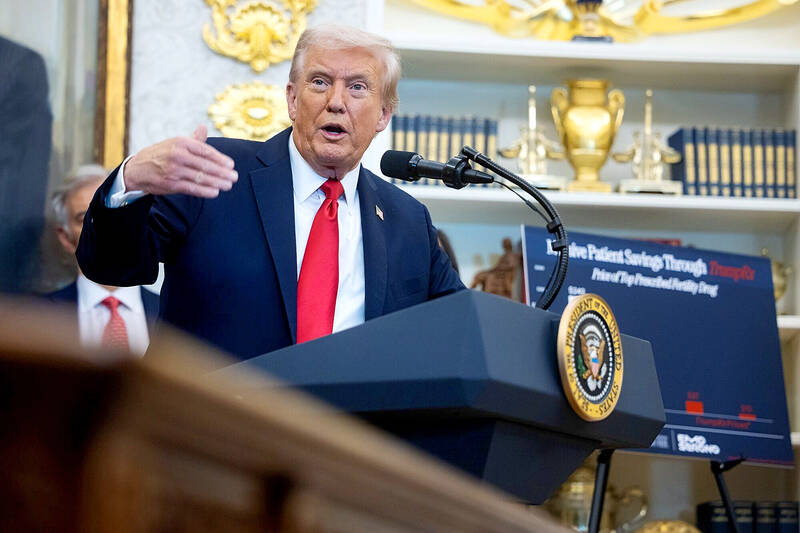US President Donald Trump’s administration formally imposed 25 percent tariffs on imported medium and heavy-duty trucks and parts, as well as a 10 percent duty on buses, while extending a key tariff reprieve for US automakers.
Trump signed a proclamation on Friday, hitting trucks and buses with tariffs beginning on Nov. 1, senior administration officials said.
The directive also prolongs through 2030 a tariff discount that Trump already provided carmakers that produce and sell completed cars in the US, and sets in motion plans to apply the same offset for truck duties.

Photo: Bloomberg
Truck imports that qualify for relief under the US-Mexico-Canada Agreement (USMCA) would be exempt from the charges, but not buses, the officials said.
The administration is also creating an additional carveout for companies that make engines for passenger vehicles as well as medium and heavy-duty trucks in the US, which would be patterned on the existing offset program for completed vehicles, but would not take effect immediately.
The decisions underscore Trump’s difficult balancing act as he seeks to reorient global trade flows and revive domestic manufacturing. Trump has broadly wielded tariffs to penalize imports and spur domestic production and jobs, but manufacturers rely on global supply chains to produce finished goods in the US, exposing even domestic production to Trump’s duties.
Some truckmakers fiercely lobbied for reductions, and other stakeholders warned about the potential for sweeping tariffs to cause higher vehicle costs, which could also ripple through the construction and shipping industries.
The USMCA exemption could potentially dull the impacts on Ram pickups made by Stellantis NV in Mexico, representing some of the about 245,000 medium and heavy-duty trucks imported to the US last year, US Department of Commerce data showed.
Under the auto-tariff relief measure, carmakers can claim an offset worth 3.75 percent of the value of their US-made vehicles, which is meant to help blunt the cost of 25 percent duties on imported parts and provide time for supply chains to be shifted to the country.
While Trump initially planned a two-year phaseout for the offset, he is now extending the initiative for five years, the officials said. The engine program is also intended to cover the same timeframe.
The concession is a win for companies, including Ford Motor Co and General Motors Co, which said that Trump’s trade policies advantaged some foreign competitors. That is particularly true for cars made in Japan, which are subject to lower 15 percent tariffs under an agreement the country struck with the US, rather than the 27.5 percent rate they were previously charged under Trump.
The car part and truck tariffs are part of an expanding pool of levies Trump is wielding against a range of consumer goods — from steel and copper to lumber and upholstered furniture.

RECYCLE: Taiwan would aid manufacturers in refining rare earths from discarded appliances, which would fit the nation’s circular economy goals, minister Kung said Taiwan would work with the US and Japan on a proposed cooperation initiative in response to Beijing’s newly announced rare earth export curbs, Minister of Economic Affairs Kung Ming-hsin (龔明鑫) said yesterday. China last week announced new restrictions requiring companies to obtain export licenses if their products contain more than 0.1 percent of Chinese-origin rare earths by value. US Secretary of the Treasury Scott Bessent on Wednesday responded by saying that Beijing was “unreliable” in its rare earths exports, adding that the US would “neither be commanded, nor controlled” by China, several media outlets reported. Japanese Minister of Finance Katsunobu Kato yesterday also

China Airlines Ltd (CAL, 中華航空) said it expects peak season effects in the fourth quarter to continue to boost demand for passenger flights and cargo services, after reporting its second-highest-ever September sales on Monday. The carrier said it posted NT$15.88 billion (US$517 million) in consolidated sales last month, trailing only September last year’s NT$16.01 billion. Last month, CAL generated NT$8.77 billion from its passenger flights and NT$5.37 billion from cargo services, it said. In the first nine months of this year, the carrier posted NT$154.93 billion in cumulative sales, up 2.62 percent from a year earlier, marking the second-highest level for the January-September

‘DRAMATIC AND POSITIVE’: AI growth would be better than it previously forecast and would stay robust even if the Chinese market became inaccessible for customers, it said Taiwan Semiconductor Manufacturing Co (TSMC, 台積電) yesterday raised its full-year revenue growth outlook after posting record profit for last quarter, despite growing market concern about an artificial intelligence (AI) bubble. The company said it expects revenue to expand about 35 percent year-on-year, driven mainly by faster-than-expected demand for leading-edge chips for AI applications. The world’s biggest contract chipmaker in July projected that revenue this year would expand about 30 percent in US dollar terms. The company also slightly hiked its capital expenditure for this year to US$40 billion to US$42 billion, compared with US$38 billion to US$42 billion it set previously. “AI demand actually

Jensen Huang (黃仁勳), founder and CEO of US-based artificial intelligence chip designer Nvidia Corp and Taiwan Semiconductor Manufacturing Co (TSMC, 台積電) on Friday celebrated the first Nvidia Blackwell wafer produced on US soil. Huang visited TSMC’s advanced wafer fab in the US state of Arizona and joined the Taiwanese chipmaker’s executives to witness the efforts to “build the infrastructure that powers the world’s AI factories, right here in America,” Nvidia said in a statement. At the event, Huang joined Y.L. Wang (王英郎), vice president of operations at TSMC, in signing their names on the Blackwell wafer to